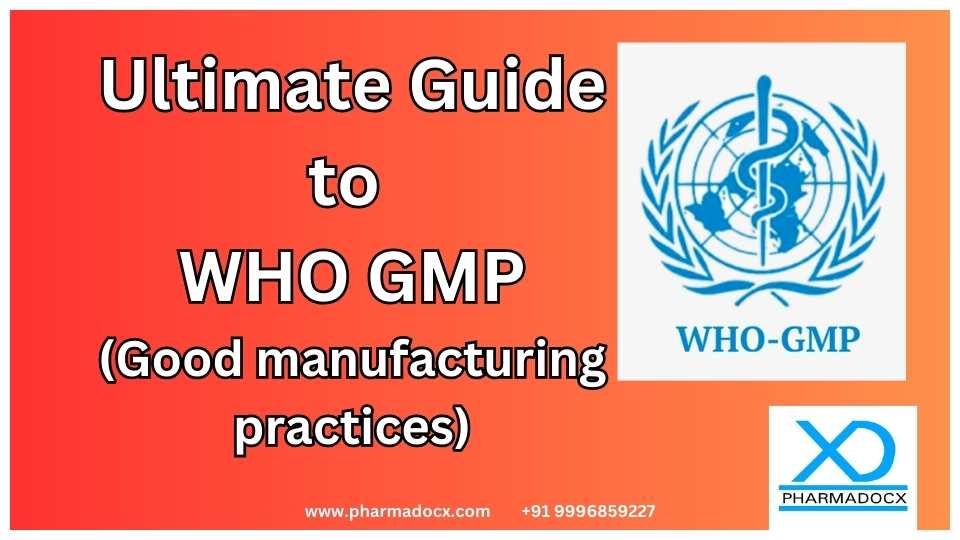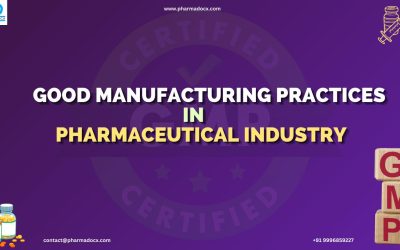The pharmaceutical industry plays a pivotal role in global health. With the increasing demand for medicines, ensuring their safety and quality becomes paramount. Enter the World Health Organization’s Good Manufacturing Practices (WHO GMP) – a set of guidelines that set the gold standard for drug production. In this guide, we’ll delve deep into the essence, history, principles, and key elements of WHO GMP.
1. Introduction to WHO GMP
What is GMP?
Good Manufacturing Practices (GMP) are a collection of guidelines that ensure the consistent production and control of medicines, ensuring their quality and safety. In simple terms, GMP ensures that medicines are consistently produced and controlled to the quality standards appropriate for their intended use.
The Role of WHO in GMP
The World Health Organization (WHO) is a global guardian of public health. Recognizing the importance of quality assurance in medicines, WHO has established its own GMP guidelines. These guidelines provide a foundation for ensuring that medicines are produced and distributed in a manner that meets the highest standards of safety and efficacy.
2. Historical Evolution of WHO GMP
The Birth of GMP
The concept of GMP originated in the early 20th century, but it was the thalidomide disaster in the 1960s that accelerated the development of stringent manufacturing guidelines. Thalidomide, initially marketed as a safe sleeping pill, led to thousands of birth defects worldwide.
WHO’s Response
In response to the thalidomide tragedy and other similar incidents, WHO took the lead in developing international GMP standards. These standards have evolved over the years, reflecting advancements in technology, science, and the increasing globalization of the pharmaceutical supply chain.
3. Core Principles of WHO GMP
Ensuring Quality The primary goal of GMP is to reduce risks inherent in pharmaceutical production. These risks are broadly categorized into:
- Cross-contamination: Mixing of different products.
- Mix-ups: Errors due to confusion between products or components.
- False labelling: Incorrect information on product labels.
Safety and Efficacy GMP ensures that medicines are consistently produced with the quality standards that ensure their safety and efficacy. Every step of the production process is monitored and controlled to eliminate risks.
4. Key Elements of WHO GMP
Quality Management
A pharmaceutical company must have a quality management system in place. This system oversees the quality of the drug during its entire lifecycle, ensuring that it meets the necessary quality standards.
Sanitation and Hygiene
Cleanliness is paramount. The production area, equipment, and staff must adhere to strict sanitation and hygiene standards to prevent contamination.
Qualification and Validation
Before any production begins, equipment and processes must be validated. This means proving that a process, system, or piece of equipment can consistently produce a product of the required quality.
Documentation
Every single step of the drug production process must be documented. This ensures traceability and accountability. If a batch of medicine is found to be faulty, it can be traced back to its source to identify and rectify the problem.
Good Practices in Production and Quality Control
This involves ensuring that the raw materials, premises, and equipment are suitable for production. It also ensures that there’s a quality control system in place to test the products at different stages of production.
5. Benefits of WHO GMP Compliance
Ensuring Product Quality and Consistency
GMP ensures that every batch of a product meets the required quality standards. This consistency means that consumers can trust the safety and efficacy of their medicines.
Minimizing Risks
By adhering to GMP guidelines, pharmaceutical companies can minimize the risks associated with drug production, such as contamination, mix-ups, and false labeling.
Enhancing International Credibility
For pharmaceutical companies looking to export their products, GMP compliance is often a requirement. Being GMP-certified can open doors to international markets and boost a company’s credibility.
Market Trust
Consumers and healthcare professionals trust medicines from GMP-compliant companies. This trust can lead to increased brand loyalty and market share.
6. Challenges in WHO GMP Implementation
Understanding the Complex Landscape
The path to GMP compliance, while rewarding, is not without its hurdles. Delving deeper into these challenges:
- Technological Integration: As the pharmaceutical industry rapidly evolves, integrating new technologies while maintaining GMP compliance becomes a complex task. For instance, the adoption of AI in drug discovery or blockchain in supply chain management requires new protocols to ensure quality and safety.
- Continuous Training: The pharmaceutical landscape is ever-changing. This necessitates ongoing training for staff at all levels, ensuring they’re updated on the latest GMP standards, methodologies, and technologies.
- Resource Constraints: Especially for smaller pharmaceutical firms or startups, the financial and manpower costs associated with GMP compliance can be significant. Balancing these demands with other business needs can be a delicate act.
- Cultural Shifts: For companies that have operated without strict adherence to GMP in the past, fostering a culture of compliance and quality can be a significant challenge. This requires a top-down approach, with leadership emphasizing the importance of GMP at every level.
7. WHO GMP in the Global Context
A Universal Benchmark in a Diverse World
The global recognition of WHO’s GMP standards has made it a touchstone for pharmaceutical quality. Here’s a deeper dive into its global significance:
- Harmonization Across Borders: While many countries have their own GMP guidelines, the WHO GMP often serves as a foundational framework. This harmonization facilitates smoother international trade and collaborations.
- Trade and Regulatory Considerations: For pharmaceutical companies with an eye on international markets, WHO GMP compliance can simplify regulatory approvals, as these standards are widely recognized and trusted.
- Global Health Implications: Beyond business considerations, WHO GMP plays a crucial role in global health. Ensuring that medicines produced in one country are of a standard acceptable worldwide is vital in an interconnected world, especially evident in global vaccination campaigns or pandemic responses.
8. Future of WHO GMP
Navigating Tomorrow’s Pharmaceutical Landscape
- Digital Transformation: The future of pharmaceuticals is digital. From AI-driven drug discovery to blockchain in supply chain transparency, the integration of these technologies presents both opportunities and challenges for GMP compliance.
- Emerging Drug Modalities: As the industry explores novel drug delivery methods, biologics, and personalized medicine, GMP guidelines will need to evolve to address the unique challenges and opportunities they present.
- Strengthened Global Collaborations: With the pharmaceutical industry’s increasing globalization, there will be a growing emphasis on international collaborations. Shared research, joint ventures, and multinational clinical trials will necessitate universally accepted and adhered to GMP standards.
- Environmental and Sustainability Concerns: The future of GMP will also consider the environmental impact of pharmaceutical production. This includes waste management, energy consumption, and sustainable sourcing of raw materials.
9. Resources and Further Reading
Empowering the Industry with Knowledge
- Official WHO GMP Guidelines: This foundational document is essential for anyone in the pharmaceutical industry, offering a detailed overview of GMP standards.
- Books and Scholarly Articles: The world of GMP is vast. Numerous scholarly articles, research papers, and books delve deep into its nuances, offering insights, case studies, and best practices.
- Training Programs and Workshops: With the ever-evolving nature of the pharmaceutical industry, continuous learning is crucial. Many institutions and organizations offer courses, workshops, and seminars on GMP compliance, ensuring professionals stay updated.
- Online Forums and Communities: Engaging with peers in the industry can offer practical insights, shared challenges, and collaborative solutions. Numerous online forums and communities focus on GMP discussions, updates, and problem-solving.
Conclusion
The journey towards WHO GMP compliance is a continuous one, demanding dedication, resources, and a commitment to excellence. As the pharmaceutical industry continues to evolve, so will GMP standards. By understanding the broader context, challenges, and future of WHO GMP, pharmaceutical companies can better navigate the intricate landscape of drug production, ensuring safety, efficacy, and quality at every step.
How Pharmadocx Consultants can help you?
Navigating WHO GMP can be complex, but with Pharmadocx Consultants by your side, certification becomes seamless. Trust our expertise to elevate your standards and achieve global compliance. Let’s embark on this journey to excellence together. Contact us now!
Related Posts-



0 Comments